
Shi et al. have reported a nickel-catalyzed decarbonylative Suzuki–Miyaura reaction which uses an N-aroylpiperidine-2,6-dione as the coupling partner for the boronic acid ( Angew. Chem., Int. Ed. 2016, 55, 6959−6963).
The method is attractive from the point of view of the stability of N-aroylpyrrolidine-2,5-diones toward storage and manipulation and the flexibility they add to the chemist’s toolbox, given their preparation from a different group of precursors to aryl halides or triflates.
Notably, the reaction uses an air-stable and inexpensive nickel catalyst, and the reactions tolerate the presence of water. While a standard reaction temperature of 150 °C is quoted, the use of temperatures as low as 80 °C also seem to be possible. Coupling efficiency is reported to be adversely affected when the aromatic rings of both of the coupling partners bear electron-donating substituents.
Ortho substituents on the aromatic rings seem to be beneficial as they facilitate decarbonylation as part of the cross-coupling. Oxidative addition into the N–C(aroyl) bond of the amide is proposed as initiating the catalytic cycle and is possible on account of a reduction in the resonance stabilization of the N-aroyl functionality versus a conventional aromatic amide.
Suzuki–Miyaura Coupling
Synthesis of Biaryls through Nickel-Catalyzed Suzuki–Miyaura Coupling of Amides by Carbon–Nitrogen Bond Cleavage (pages 6959–6963)Shicheng Shi, Guangrong Meng and Prof. Dr. Michal Szostak
Version of Record online: 21 APR 2016 | DOI: 10.1002/anie.201601914


1H NMR (500 MHz, CDCl3) δ 7.70 (s, 4 H), 7.61 (d, J = 7.3 Hz, 2 H), 7.48 (t, J = 7.6 Hz, 2 H), 7.42 (t, J = 7.3 Hz, 1 H).

13C NMR (125 MHz, CDCl3) δ 144.87, 139.92, 129.48 (q, J F = 32.5 Hz), 129.13, 128.32, 127.56, 127.42, 125.83 (q, J F = 3.8 Hz), 124.46 (q, J F = 270.0 Hz).
Version of Record online: 21 APR 2016 | DOI: 10.1002/anie.201601914

Breaking and making: The first nickel-catalyzed Suzuki–Miyaura coupling of amides for the synthesis of biaryl compounds through N−C amide bond cleavage is reported. The reaction tolerates a wide range of sensitive and electronically diverse substituents on both coupling partners.

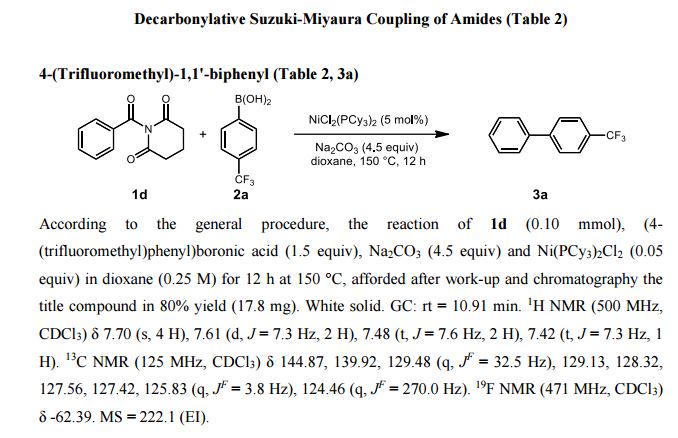
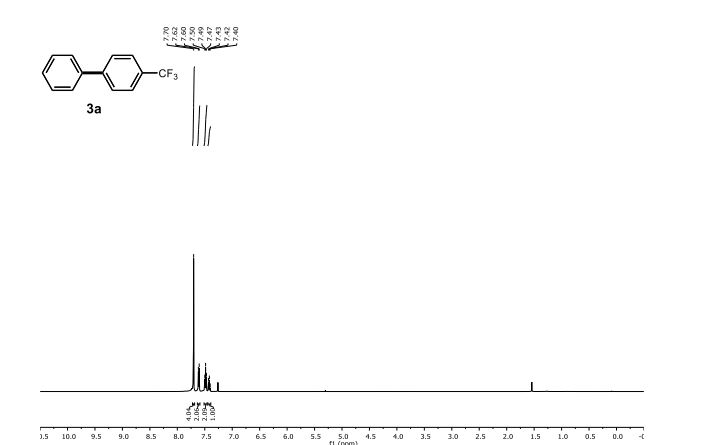
1H NMR (500 MHz, CDCl3) δ 7.70 (s, 4 H), 7.61 (d, J = 7.3 Hz, 2 H), 7.48 (t, J = 7.6 Hz, 2 H), 7.42 (t, J = 7.3 Hz, 1 H).
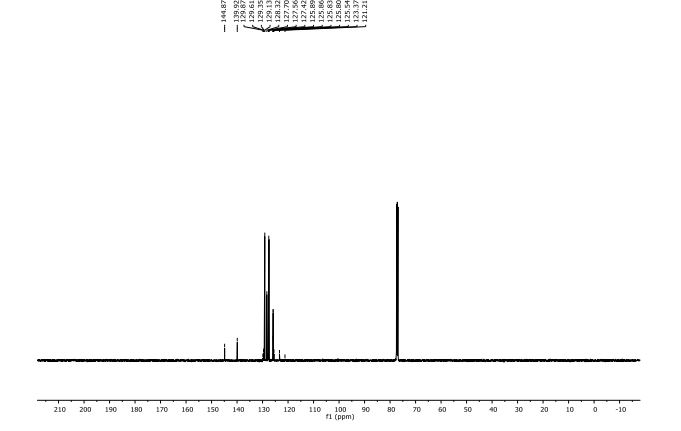
13C NMR (125 MHz, CDCl3) δ 144.87, 139.92, 129.48 (q, J F = 32.5 Hz), 129.13, 128.32, 127.56, 127.42, 125.83 (q, J F = 3.8 Hz), 124.46 (q, J F = 270.0 Hz).
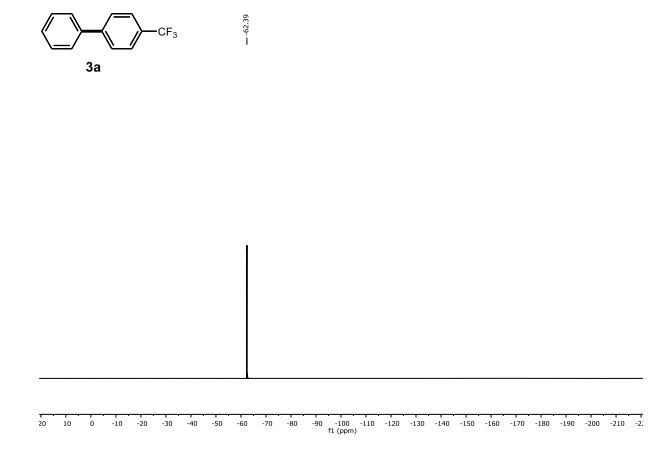
19F NMR (471 MHz, CDCl3) δ -62.39.
| Michal Szostakemail: michal.szostak@rutgers.edu office: Olson 204 |
Research Interests
The central theme of our research is synthetic organic and organometallic chemistry with a focus on the development of new synthetic methods based on transition metal catalysis and various aspects of transition metal mediated free radical chemistry and their application to the synthesis of biologically active molecules.Selected Publications
- Graphene-Catalyzed Direct Friedel-Crafts Alkylation Reactions: Mechanism, Selectivity and Synthetic Utility. Hu, F.; Patel, M.; Luo, F.; Flach, C.; Mendelsohn, R.; Garfunkel, E.; He, H.; Szostak, M. J. Am. Chem. Soc. 2015, 137 [doi]
- General Olefin Synthesis by the Palladium-Catalyzed Heck Reaction of Amides: Sterically-Controlled Chemoselective N-C Activation. Meng, G.; Szostak, M. Angew. Chem. Int. Ed. 2015, 54[doi]
- Aminoketyl Radicals in Organic Synthesis: Stereoselective Cyclization of 5- and 6-Membered Cyclic Imides to 2-Azabicycles using SmI2-H2O. Shi S.; Szostak, M. Org. Lett. 2015, 17, 5144 [doi]
- Sterically-Controlled Pd-Catalyzed Chemoselective Ketone Synthesis via N-C Cleavage in Twisted Amides. Meng, G.; Szostak, M. Org. Lett. 2015, 17 [doi]
- Recent Developments in the Synthesis and Reactivity of Isoxazoles: Metal Catalysis and Beyond.Hu, F.; Szostak, M. Adv. Synth. Catal. 2015, 357, 2583. [doi]
- Determination of Structures and Energetics of Small- and Medium-Sized One-Carbon Bridged Twisted Amides using ab Initio Molecular Orbital Methods. Implications for Amidic Resonance along the C-N Rotational Pathway. Szostak, R.; Aubé, J.; Szostak, M. J. Org. Chem. 2015, 80, 7905. [doi]
- An Efficient Computational Model to Predict Protonation at the Amide Nitrogen and Reactivity along the C-N Rotational Pathway. Szostak, R.; Aubé, J.; Szostak, M. Chem. Commun. 2015, 51, 6395.[doi]
- Pd-Catalyzed C-H Activation: Expanding the Portfolio of Metal-Catalyzed Functionalization of Unreactive C-H Bonds by Arene-Chromium π-Complexation. Hu, F.; Szostak, M. ChemCatChem2015, 7, 1061. [doi]
- Highly Chemoselective Reduction of Amides (Primary, Secondary and Tertiary) to Alcohols using SmI2/H2O/Amine under Mild Conditions. Szostak, M.; Spain, M.; Eberhart, A. J.; Procter, D. J. J. Am. Chem. Soc. 2014, 136, 2268. [doi]
- Substrate-Directable Electron Transfer Reactions. Dramatic Rate Enhancement in the Chemoselective Reduction of Cyclic Esters using SmI2-H2O: Mechanism, Scope and Synthetic Utility. Szostak, M.; Spain, M.; Choquette, K. A.; Flowers, R. A., II; Procter, D. J. J. Am. Chem. Soc.2013, 135, 15702. [doi]
- Selective Reduction of Barbituric Acids using SmI2-H2O: Synthesis, Reactivity and Structural Analysis of Tetrahedral Adducts. Szostak, M.; Spain, M.; Behlendorf, M; Procter, D. J. Angew. Chem. Int. Ed. 2013, 52, 12559. [doi]
- Non-Classical Lanthanide(II) Iodides: Uncovering the Importance of Proton Donors in TmI2-Promoted Electron Transfer. Facile C-N Bond Cleavage in Unactivated Amides. Szostak, M.; Spain, M.; Procter, D. J. Angew. Chem. Int. Ed. 2013, 52, 7237. [doi]
- Chemistry of Bridged Lactams and Related Heterocycles. Szostak, M.; Aubé, J. Chem. Rev. 2013,113, 5701. [doi]
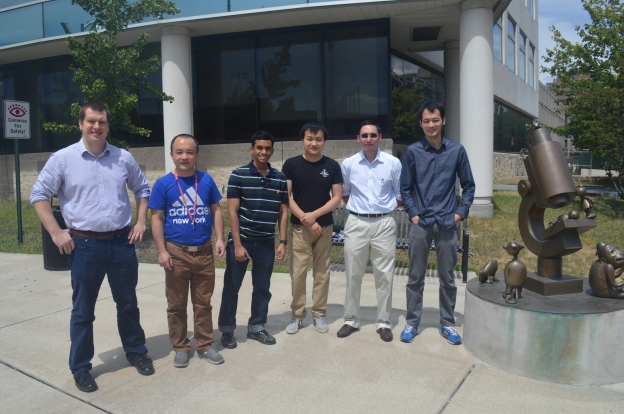
GROUP
Prof. Michal Szostak
Assistant Professor
Ph.D., University of Kansas (2009) with Jeffrey Aubé
Postdoctoral, Princeton University (2010) with David MacMillan
Postdoctoral, University of Manchester (2011-2014) with David Procter
Postdoctoral Researchers
Dr. Feng Hu
Ph.D., Nanjing University, 2009 (Z. Huang)
Postdoctoral, Shanghai Institute of Materia Medica (Y. Hu)
Research Assistant Professor, SIOC (Q. Shen)
Postdoctoral, Lamar University (X. Lei)
Dr. Pradeep Nareddy
Ph.D., University of Geneva, 2013 (C. Mazet)
Postdoctoral, Leipzig University (C. Schneider)
Graduate Students
Shicheng Shi
M.S., SIOC, 2013 (R. Wang)
B.S., Nanjing Agriculture University, 2010
Guangrong Meng
M.S., Fudan University, 2014 (Q. Zhang)
B.S., Dalian Medical University, 2011
Chengwei Liu
M.S., Soochow University, 2014 (Y. Yao)
B.S., Zaozhuang University, 2011
Undergraduate Students
Syed Huq (Rutgers, Chemistry, 2014-present)
Marcel Achtenhagen (Rutgers, Chemistry, 2015-present)
Visiting Students
Yongmei Liu (Yangzhou University, R. Liu)
//////Nickel-Catalyzed, Decarbonylative Suzuki–Miyaura Coupling, Amides, Biaryls
NARRAGANSETT, RHODE ISLAND, USA
Hi Everyone. Today's trip takes us to a New England state. We are
going to Narragansett, Rhode Island. I have been there and it is
a beautiful place.
Narragansett is a town in Washington County, Rhode Island, United
States. The population was 15,868 at the 2010 census. However, during
the summer months the Town's population more than doubles to near
34,000. The nickname for the town is "Gansett". The town of
Narragansett occupies a narrow strip of land running along the eastern
bank of the Pettaquamscutt River to the shore of Narragansett Bay. It
was incorporated as a town in 1901.
Narragansett is known for its summer recreation and beaches.
Fishermen's Memorial State Park, contains a former military fort.
January is normally the coldest month with average temperatures between
19 and 38 degrees Fahrenheit. July is normally the warmest month
with average temperatures between 60 and 81 degrees F. March is
normally the rainiest month with an average of 5 inches, and a yearly
average of 49.6 inches of rain. February is normally the snowiest
month with an average of 9.9 inches, and a yearly average of 34
inches of snow.
I hope you enjoy the beautiful scenery of Narragansett, Rhode Island.
THE TOWERS





 NARRAGANSETT BAY
NARRAGANSETT BAY







 BEACH
BEACH



 BLACK POINT
BLACK POINT
 BETWEEN BLACK POINT AND SCARBOROUGH BEACH
BETWEEN BLACK POINT AND SCARBOROUGH BEACH
 POINT JUDITH LIGHTHOUSE
POINT JUDITH LIGHTHOUSE

 CASTLE HILL LIGHTHOUSE
CASTLE HILL LIGHTHOUSE
 WHALE ROCK LIGHTHOUSE
WHALE ROCK LIGHTHOUSE
 HOG ISLAND SHOAL LIGHTHOUSE
HOG ISLAND SHOAL LIGHTHOUSE
 LIGHTHOUSES (I DON'T KNOW THE NAMES)
LIGHTHOUSES (I DON'T KNOW THE NAMES)


 ROW OF HOTELS
MISCELLANEOUS
ROW OF HOTELS
MISCELLANEOUS

 ATLANTIC HOUSE
ATLANTIC HOUSE
 OLD EPISCOPAL CHURCH
OLD EPISCOPAL CHURCH
 CHURCH
CHURCH
 A WATERFRONT HOME
SEALS
A WATERFRONT HOME
SEALS
 OLD PHOTOS
OLD PHOTOS
 1910
1910
 HOUSES FOR SALE
HOUSES FOR SALE










Hi Everyone. Today's trip takes us to a New England state. We are
going to Narragansett, Rhode Island. I have been there and it is
a beautiful place.
Narragansett is a town in Washington County, Rhode Island, United
States. The population was 15,868 at the 2010 census. However, during
the summer months the Town's population more than doubles to near
34,000. The nickname for the town is "Gansett". The town of
Narragansett occupies a narrow strip of land running along the eastern
bank of the Pettaquamscutt River to the shore of Narragansett Bay. It
was incorporated as a town in 1901.
Narragansett is known for its summer recreation and beaches.
Fishermen's Memorial State Park, contains a former military fort.
January is normally the coldest month with average temperatures between
19 and 38 degrees Fahrenheit. July is normally the warmest month
with average temperatures between 60 and 81 degrees F. March is
normally the rainiest month with an average of 5 inches, and a yearly
average of 49.6 inches of rain. February is normally the snowiest
month with an average of 9.9 inches, and a yearly average of 34
inches of snow.
I hope you enjoy the beautiful scenery of Narragansett, Rhode Island.
THE TOWERS
NARRAGANSETT BAY
BEACH
BLACK POINT
BETWEEN BLACK POINT AND SCARBOROUGH BEACH
POINT JUDITH LIGHTHOUSE
CASTLE HILL LIGHTHOUSE
WHALE ROCK LIGHTHOUSE
HOG ISLAND SHOAL LIGHTHOUSE
LIGHTHOUSES (I DON'T KNOW THE NAMES)
ROW OF HOTELS
MISCELLANEOUS

ATLANTIC HOUSE
OLD EPISCOPAL CHURCH
CHURCH
A WATERFRONT HOME
SEALS
OLD PHOTOS
1910
HOUSES FOR SALE
///////